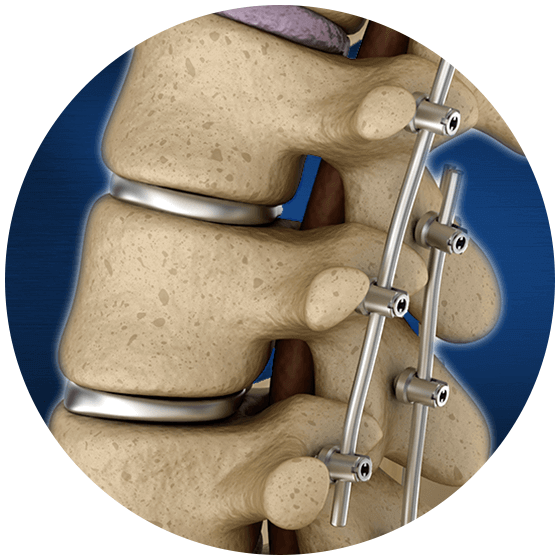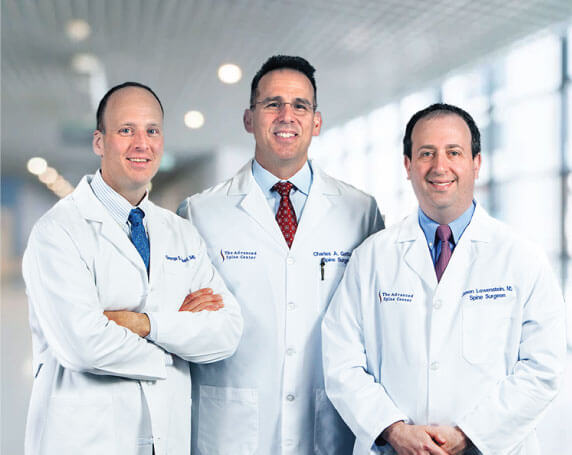Failed Back Syndrome in New Jersey & New York
When back surgery doesn't deliver the relief you expected, the resulting pain and frustration can feel overwhelming. At the Advanced Spine Center, we specialize in helping patients who experience failed back syndrome, offering proven treatment strategies to help you find the relief you deserve after a failed back surgery.

What is Failed Back Surgery Syndrome?
Failed back surgery syndrome (FBSS), often referred to as failed back syndrome, describes persistent or recurrent pain following spine surgery. Despite the name, this condition doesn’t mean your surgery was performed incorrectly. Rather, it reflects the complex nature of spine conditions and the reality that surgical outcomes can vary based on multiple factors.
Patients with FBSS typically experience ongoing lower back pain, leg pain, or both, despite undergoing procedures intended to resolve these issues. The pain may be similar to what you felt before surgery, or it might present differently. Some patients notice initial improvement after their procedure, only to have symptoms return weeks or months later. Others find their pain never fully resolved.
Understanding failed back surgery syndrome is a critical first step toward finding effective care for your back pain. At our leading spine clinics in New Jersey and New York, we take the time to investigate your failed back syndrome symptoms and develop a customized course of treatment to help address your specific situation and provide much-needed relief.
Failed Back Surgery Syndrome Symptoms and Signs
While every patient’s experience is unique, most people with FBSS share a common thread: they expected their back surgery to bring relief from the pain, yet discomfort, limitations, and lingering issues continue to affect their daily lives.
If you’re wondering whether your post-surgical symptoms are normal or indicate a more serious problem, understanding the common signs of failed back surgery can offer some insights. Common symptoms of failed back syndrome include:
- Back or spine pain that persists or returns
- Radiating leg pain
- Reduced mobility
- Numbness or tingling
- Muscle weakness
- Sleep disturbances
- Medication dependency
If you’re struggling with any combination of these signs after spine surgery, evaluation by an experienced specialist like the failed back surgery doctors at the Advanced Spine Center can help identify the issue, determine whether you may have failed back syndrome, and get you started toward a life free from back pain.
Failed Back Surgery Syndrome Treatment Options
Treatment for failed back surgery syndrome requires a thorough evaluation to identify the specific factors contributing to your ongoing symptoms. At the Advanced Spine Center, we’ll perform a clinical assessment and any necessary imaging to understand what’s causing your pain and develop a treatment strategy for the best possible outcome.
Conservative Treatment Approaches
Many patients benefit from targeted nonsurgical interventions before considering additional procedures. Physical therapy designed specifically for post-surgical patients can help improve strength, flexibility, and movement patterns. Pain management techniques, including specialized injections and nerve blocks, may provide significant relief by addressing inflammation and nerve irritation.
Revision Spine Surgery
In select cases, revision spine surgery becomes the most appropriate option. This advanced surgical approach addresses specific anatomical problems that prevent healing, such as recurrent disc herniation, spinal instability, or hardware complications. Our surgeons employ state-of-the-art techniques and technology to correct these issues while minimizing risks and promoting optimal recovery.
Minimally Invasive Interventions
When conservative measures don't provide adequate relief, minimally invasive interventional procedures may be employed. These can include more advanced pain-relieving injections to reduce inflammation around compressed nerves or spinal cord stimulation (also known as neurostimulation) to interrupt nerve pain signals to the brain.
Pain Management
Especially for those with failed back syndrome, pain management is often necessary to maintain a normal quality of life and the ability to complete daily tasks. Your doctor may prescribe over-the-counter, prescription strength drugs, or targeted injections of cortisol.
What Causes Failed Back Surgery Syndrome?
Understanding why symptoms persist after failed back surgery requires examining all possible medical, technical, and biological factors. While multiple causes can contribute to failed back surgery syndrome, several patterns appear most frequently:
- Recurrent or persistent disc herniation
- Spinal instability
- Scar tissue formation
- Hardware complications
- Adjacent segment disease
- Nerve damage
- Spinal stenosis progression
- Incomplete diagnosis
Patient-specific factors can also play a role, including individual healing responses, bone quality, body mechanics, and overall health. Conditions like diabetes, smoking, or autoimmune disorders can affect tissue healing and recovery.
Advanced imaging studies, detailed physical examinations, and even diagnostic injections can help our failed back syndrome specialists at the Advanced Spine Center pinpoint exactly what’s generating your pain and how to treat it, allowing us to deliver results that are truly life-changing for our patients.
What Our Patients Are Saying
I originally had surgery in 1991. I suffered for the past 12 years with excruciating pain. I went to multiple orthopedics and pain management doctors and all said they couldn’t do more than shots for pain and pain meds. I couldn’t deal with the pain any longer and came across Dr. Lowenstein. At my first appointment he knew exactly what he could do to fix me. […]
-Gina K. ⭐️⭐️⭐️⭐️⭐️
I have only had wonderful experiences working with the Advanced Spine Center! Dr. Naseef, Matt and the team have been amazing partners in my care and multiple spine surgeries. Interacting with everyone from the reception desk to the office staff has been a smooth and easy process. My phone calls are returned and attention to my needs always given. I am so grateful to my care team for all the help they have given me over the last 11 years!
-Lindsay M. ⭐️⭐️⭐️⭐️⭐️
Met with Dr Lowenstein, he was informative and talked me through my situation and options. He performed surgery which was successful and he and his team have been working with me throughout my recovery. Recovery is long with nerve pain but he and his team have been there answering questions and supporting me.
-Gary G. ⭐️⭐️⭐️⭐️⭐️
Minimally Invasive Surgery for Failed Back Surgery Syndrome
At the Advanced Spine Center in New Jersey and New York, we specialize in minimally invasive spine revision surgery that provides effective pain relief with shorter recovery times compared to traditional surgery. Our minimally invasive failed back syndrome surgery approaches provide:
- Smaller Incisions – Reduced scarring and better cosmetic outcomes
- Faster Recovery – Shorter hospital stays and quicker return to activities
- Less Pain – Reduced post-operative discomfort and medication needs
- Better Outcomes – Excellent correction with preserved mobility
With a team of fellowship-trained spine surgeons specializing in failed back surgery syndrome treatment, the Advanced Spine Center has successfully restored mobility and eliminated pain for thousands of patients throughout New Jersey and New York.
Why Choose Us for Advanced Spine Care
The Advanced Spine Center in New Jersey is recognized as a leading destination for spine treatment in the nation. Patients choose us for their spine treatment because we offer:

Comprehensive Care
From initial evaluation to post-surgical care, we provide complete spine care. Our multidisciplinary team ensures optimal outcomes for every patient.

Advanced Technology
State-of-the-art imaging, surgical navigation systems, and minimally invasive instruments enable precise, safe spine care with excellent results.

Convenient Location
Easily accessible in New Jersey and New York , our modern facility provides comfortable care in a convenient location. Plus, patients from across the nation, and even world wide, find come to us!
Frequently Asked Questions About Failed Back Surgery Syndrome
Failed back surgery syndrome affects approximately 10-40% of patients who undergo spine surgery, though rates vary depending on the type of procedure performed and individual patient factors. While these statistics might seem concerning, it’s important to remember that many cases of FBSS respond well to appropriate treatment. The key is accurate diagnosis and working with specialists experienced in managing complex spine conditions like the doctors at the Advanced Spine Center.
While not all cases can be prevented, certain factors influence surgical outcomes. Choosing an experienced spine surgeon, following post-surgical rehabilitation protocols carefully, maintaining healthy habits like not smoking, and managing conditions like diabetes all contribute to better outcomes. Some anatomical factors and individual healing responses remain beyond our control, which is why even well-performed surgeries can sometimes result in FBSS.
Initial discomfort following spine surgery is normal and expected. However, if your pain isn’t gradually improving by 3-6 months post-surgery, or if you experience new symptoms that weren’t present before your procedure, it’s worth seeking evaluation. Earlier intervention often leads to better outcomes, as addressing problems before they become chronic typically improves treatment success rates.
Not necessarily. Many patients find relief through nonsurgical treatments, including targeted injections, physical therapy, medication management, or advanced therapies like spinal cord stimulation. Surgery becomes appropriate only when conservative treatments haven’t provided adequate improvement and diagnostic studies identify a specific anatomical problem that can be surgically corrected.
Treating FBSS requires both technical expertise and diagnostic sophistication. Our team specializes in complex spine conditions, including revision cases that other centers may not handle routinely. We invest significant time in diagnostic evaluation to understand exactly what’s causing persistent symptoms before recommending treatment. We utilize the most advanced surgical techniques and technology available, which translates to better outcomes and faster recovery when revision surgery is necessary.
Ready to Take the Next Step in Your Spine Care?
You don’t have to live with pain from a failed back surgery: Contact the leading failed back syndrome doctors in NJ & NY today!
